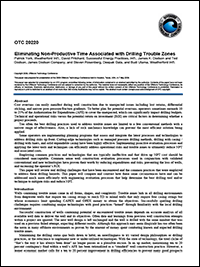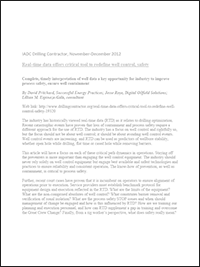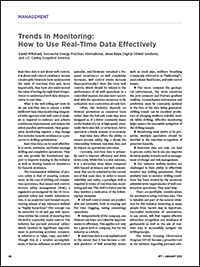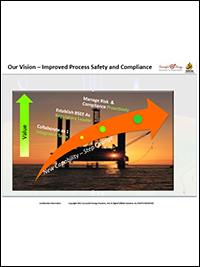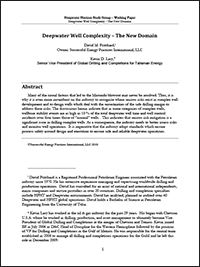Publications & Links
Publications:
The Virtual Barrier: A Paradigm Shift in Process Safety
Abstract
In March 2014, the Society of Petroleum Engineers (SPE) Aberdeen held the first international conference on how to address the type of risk assessment that drilling thought leader David Pritchard had written about for so many years. SPE Aberdeen selected Pritchard to speak and also to be a panelist at SPE’s “Another Perspective on Risk – The Tipping Point,” keynoted by Lord Cullen of Whitekirk, the judge who conducted the Piper Alpha inquiry and published the The Public Inquiry Into the Piper Alpha Disaster1, to look at Piper Alpha and Macondo through the lens of the true cost in human lives…
Eliminating Non-Productive Time Associated with Drilling Trouble Zones
Abstract
Cost overruns can easily manifest during well construction due to unexpected issues including lost returns, differential sticking, and narrow pore pressure/fracture gradients. To better plan for potential overruns, operators sometimes earmark 10 to 25% of the Authorization for Expenditures (AFE) to cover the unexpected, which can significantly impact drilling budgets. Technical and operational risks versus the potential return on investment (ROI) are critical factors in determining whether a project proceeds…
Real-time data offers critical tool to redefine well control, safety
Abstract
The industry has historically viewed real-time data (RTD) as it relates to drilling optimization. Recent catastrophic events have proven that loss of containment and process safety require a different approach for the use of RTD. The industry has a focus on well control and rightfully so, but the focus should not be about well control; it should be about avoiding well control events. Well control events are increasing, and RTD can be used as predictors of wellbore stability, whether open hole while drilling, flat time or cased hole while removing barriers…
Trends in Monitoring: How to Use Real-Time Data Effectively
Abstract
Real-time data is not about well control, it is about well control avoidance. Recent catastrophic blowouts have underscored the value of real-time data and, more importantly, they have also underscored the value of having the right kind of experience to understand well data interpretation in real time…
Our Vision – Improved Process Safety and Compliance
Abstract
Our collective goals include instilling a stronger sense of safety and environmental responsibility among operators, while promoting compliance with regulation. We face the challenges of keeping pace with technological and process innovations from operators and equipment manufacturers as well as developing analytic tools that will enable us to compare, assess, and identify risks earlier…
Achieving Savings through Reliability using Real Time Data
Abstract
Historically, the drilling industry has utilized real time data (RTD) for improving drilling efficiencies, documenting occurred events, and reactive decision-making. RTD should promote situational awareness with respect to wellbore instability and hazards. Drilling trends identifiable in RTD change over time as abnormal trends leading to hazards and rarely occur instantaneously. These destabilizing events such as cuttings loading, barrier compromise, kicks, pack-offs, wellbore collapse, or other mechanical and pressure-related causes, whether in rotating or flat-time operations, can be avoided or mitigated. Accepting these hazards as a necessary outcome of drilling operations can be a dangerous proposition and denies risk accountability…
Deepwater Well Complexity – The New Domain
Abstract
Many of the causal factors that led to the Macondo blowout may never be resolved. Thus, it is why it is even more incumbent on the industry to recognize where serious risks exist in complex well development and to design wells which deal with the uncertainties of the safe drilling margin to address these risks. The discussions herein indicate that in some categories of complex wells, wellbore stability events are as high as 10 % of the total deepwater well time and well control incidents over four times those of “normal” wells. . This indicates that serious risk mitigation is a significant issue in drilling complex wells. As a consequence, the industry needs to better assess risks and monitor well operations. It is imperative that the industry adopt standards which ensure process safety around design and execution to ensure safe and reliable deepwater operations…


